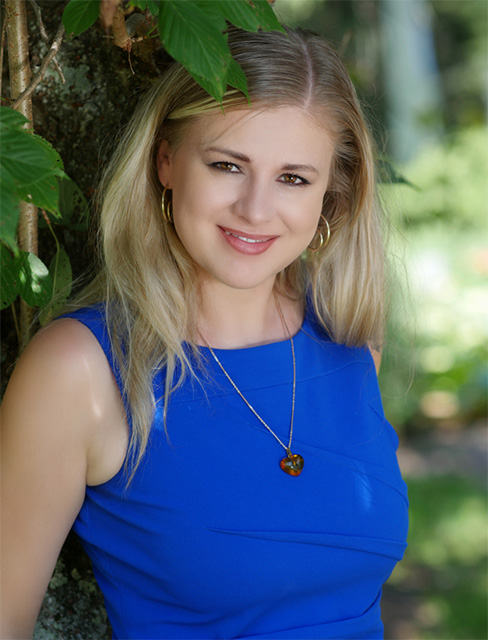If you ask Natalja Sticco, it takes a village—and then some—to succeed in music. From her beginnings as a pianist to being told not to pursue specialized training in singing, she’s learned that the path to a successful career in opera is far from straightforward. “Over time, you start to understand how important it is to you,” she reflects. “When you try something else and still want to pursue your dream, that’s a sign it might be the right profession. When you’re young, you’re not familiar with the downsides; you just think it’s all glamour—beautiful dresses, makeup. But it’s not even close to that.”
For Natalja, one of her key relationships has been with her husband, who acts as her negotiator, manager, and even personal assistant. She credits him with playing a vital role behind the scenes. “As a singer, you’re often too focused on perfecting your craft—on mastering the music, attending lessons, and listening to countless recordings. But what happens behind the scenes is just as important, especially nowadays. It’s not just about talent or hard work; luck and marketing play big roles too. I’m so fortunate to have someone dedicated to handling that ‘dirty work’ for me.”
Her husband has also been instrumental in expanding her musical horizons, particularly into the crossover genre. “He encouraged me to explore new areas, and ‘Requiem for a Soldier’ was a hit when I first recorded it during COVID. It was my first time trying something outside of opera.”
This exploration not only introduced Natalja to new repertoire but also led her down a nontraditional path. After leaving Latvia and moving to the U.S., she struggled to find support within the local opera community and quickly learned not to focus on pleasing critics—or sometimes even your colleagues. “Unfortunately, very few people in this crowd are trying to help you. They see you as a competitor and look for ways to either learn from you or undermine you.” Despite these challenges, she realized that the way forward was to connect directly with the public. “We started taking opera outside of the traditional community, performing for the VA and people who had never been exposed to opera. We even explained opera in more general terms.”
Instead of performing entire roles, Natalja began mixing arias from various operas to create unique shows that appealed to first-time listeners. This approach started to pay off in a big way. While audiences didn’t always understand the original languages, they felt the emotion behind the music, which was incredibly rewarding for Natalja. She also took her crossover experimentation further by collaborating with jazz pianist BK Davis. “It was my first big experience with jazz, and I loved how spontaneous it was. Jazz involves a lot of improvisation, so the final product is often very different from what you rehearsed! It brings out a different side of you and makes you enjoy the music without worrying about what the composer intended.”
Natalja revealed that she plans to “dig deep into the American songbook” and explore the musical theater repertoire. She’s eager to learn how to belt—a technique where vocalists use their chest voice to create a stronger, more contemporary sound. It varies from opera where she would use more of a resonant ‘head’ voice with the intention to project over an orchestra. “When I do crossover musical theater now, everyone hears that I’m an opera singer. So my new experiment will be to introduce something completely new in terms of my voice.”
It’s clear that making music independently excites Natalja, who, like many singers, has struggled with the complexities of the music industry. “Getting recognition from the industry is one thing, but having your own audience that admires and inspires you is even more important. When you just aim to impress your operatic colleagues, you end up obsessing over being the ‘right’ version of yourself instead of being authentic. I think it’s crucial to find your own way of projecting emotion and connecting with an audience that appreciates you for who you truly are.”
View this post on Instagram
Opera for the people—it’s something Natalja is confident anyone can come to enjoy. “If you haven’t enjoyed opera so far,” she says, “you probably attended the wrong production. Unfortunately, the opera world today is trying to modernize performances to attract younger audiences. They’re making it cinematic, broadcasting it in movie theaters, and focusing on looks—model-like girls and six-pack abs for the guys. But opera isn’t about that. Opera is about the voice, the emotions, and the technique. As much as modern opera tries to commercialize itself with looks, it’s not doing the art any favors.”
She also encourages audiences to attend live performances rather than relying solely on recordings. “Try to attend smaller, more intimate concerts where you can experience the music up close. You can see how the performer moves, how they project, how they convey emotion.”
Natalja also hopes audiences will seek out “authentic” productions set in their original time periods rather than modernized versions. “You might consider me old school, but if you want to understand what opera is, find a classical production with good feedback, solid singers, and strong technique. Just open your heart—that’s the key.”
One of the magical aspects of opera is the unamplified human voice. “You feel the vibrations, you get goosebumps—things you can’t get from a video, except maybe from some truly genius singers. I may not be at that level yet, but I’m still a work in progress. But when you hear it live, it’s a different experience. Some audience members have come to me in tears—not because I’m that good, but because they were touched. If you can resonate with people on that level, it means you’re doing something valuable, right?”







